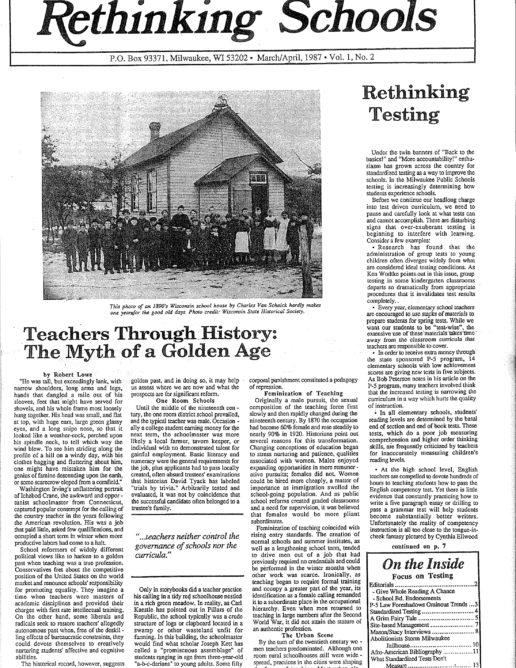Of Competencies and Calamities A Grim Fairy Tale
Once upon a time in a great kingdom on a great lake, a tremendous clamour arose among the people. “Our schools,” they cried, “are not making the grade! Our children learn little; they cannot even write.” And so. the King’s High Council on Schools convened in the castle’s Grand Hall to hear the views of the populace. The millers and masons and candlestick-makers said their children learned less than those outside the city walls (and they had statistics to prove it). The merchants complained bitterly that so-called graduates could not compose the simplest of business letters. And for once, the Representatives of the Common People agreed with the merchants. “Our schools must be held to objective and effective standards!” they vehemently asserted. Even the High Lord of Schools, the Earl of McMuffin, submitted that the time had come for change.
The King’s Council, quite unable to remember a time when the people were so vocal and united, bowed their heads and whispered urgently among themselves. Soon enough, the buglers sounded their horns, the town criers sucked in deep breaths, and there was issued a Grand Proclamation of the King’s High Council on Schools:
“Hear Ye! Hear Ye!” cried the criers. “Let it be known throughout the length and breadth of the Kingdom of Greats that no child shall graduate from the Higher School ere he can compose an essay of five paragraphs and a business letter that doth meet fine standards of formality. Furthermore, let no child sally forth with a diploma who hath not first mastered the rules of our Great Language — the ins and outs, the twists and turns, the apostrophes and the semi-colons, the capitals and the quotation marks. Let our children prove they can separate the terse from the interminable, the apt from the inappropriate, and the language of the low and vulgar from the dialect of the Great and Standard! Then indeed shall greatness ring throughout the land!”
And so began the Era of the Competency Examination, and (though some children complained) most everyone was gladdened.
In the classrooms there was such a frenzy! Most conscientiously did the schoolmasters drill their young charges, and most heartily did they chastise the youths for mixing up their homonyms or capitalizing their seasons. The worksheets flew like snow flurries, and the youngsters penned five-part theme after five-part theme. They wrote of the three things they would do with a million gold coins, their most favored summer activities, three things to do at the waterfront, three ways to make winter less miserable, three ways to plow a field, and three ways to arise in the morning. They duly framed each theme with an introduction and a conclusion. Most mastered their threes and fives, but there were slow learners. Tom the Tinker’s Son, having been asked to discuss his three favored pastimes, could think of only one: playing with his falcon, Franklin. He told how Franklin dipped and soared, and how quickly Franklin learned. Tom stated with conviction that a bird could love a boy, and he confided he had sometimes longed to be himself a falcon, sweeping over the kingdom and frolicking in the winds.
To which his master replied, “Where is your five-part form? Alas, such run-ons! Your spelling is improving!”
Tom finally learned the right rote to write. He discovered that one could write by recipe, finding a thought to fit each slot. After all, as his schoolmaster earnestly advised, there would be time after the exam to write with beauty and inspiration. But a curious thing did come about. After the exam (and he did pass), no desire to write remained in Tom. “Too boring,” he said.
Indeed, the fog of boredom crept into each classroom and hung lazily there, dulling minds and dimming the senses. In few classrooms did master and students pause to wonder at the power of language, to savor the sounds, or to play with rhythm and meaning. In few classrooms did the Higher Schoolers ever read whole books, entering into fantasy to better grasp the real.
As they toiled over letters, worksheets, and five-part themes, there was no time to read, question, probe, debate, and write about the issues which engaged their passions and their minds. And curiously, those who dutifully passed the tests still struggled at the University, still lacked for jobs, still compared poorly with the children from outside the city walls.
So the people came together to ponder upon the problem. One wise old man said, “Keep the test — but cast out that frozen five-paragraph form! Let this test provoke the mind and teach our youth that good writing means thinking hard about things that matter and expressing those thoughts well.” A sage old woman, equally esteemed, declared that there should be no tests that punished the victims but other ways to better the schools from the kindergarten forward. A brave knight and slayer of dragons elocuting eloquently averred that the problems went beyond the schools to the bedrock of the kingdom; it would require all the people working everywhere to make the needed changes. And though they found no single magic answer, the people agreed that such a great kingdom needed solutions greater and more thoughtful than what had yet been tried.
When all had been said and vigorously debated, young Tom Tinker was appointed to write a report, so that all the kingdom might hear the concerns of the citizenry there gathered. Tom worked mightily at the report, for these ideas were important (and passionately felt). He saw quite clearly how the solutions fit the problems and how the problems interlocked. But try as he might, our poor young Tom could not find a way to place his thoughts in a proper five-paragraph package. And so it came to pass, alas, that young Tom succeeded at the competency test but failed to write.

